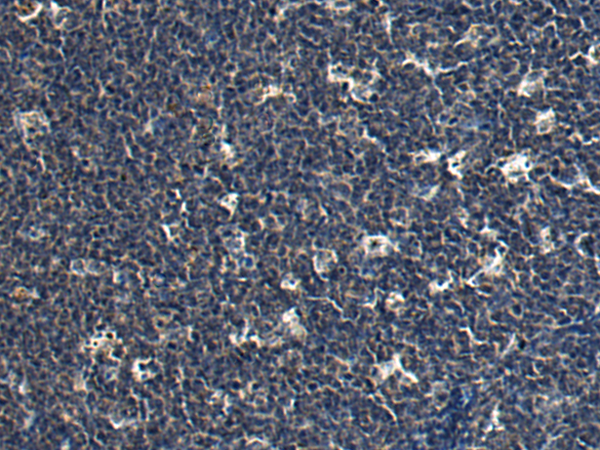
| WB | 咨询技术 | Human,Mouse,Rat |
| IF | 咨询技术 | Human,Mouse,Rat |
| IHC | 1/25-1/50 | Human,Mouse,Rat |
| ICC | 技术咨询 | Human,Mouse,Rat |
| FCM | 咨询技术 | Human,Mouse,Rat |
| Elisa | 1/5000-1/10000 | Human,Mouse,Rat |
| Aliases | EFNL3; nAChRB2 |
| Host/Isotype | Rabbit IgG |
| Antibody Type | Primary antibody |
| Storage | Store at 4°C short term. Aliquot and store at -20°C long term. Avoid freeze/thaw cycles. |
| Species Reactivity | Human, Mouse, Rat |
| Immunogen | Synthetic peptide of human CHRNB2 |
| Formulation | Purified antibody in PBS with 0.05% sodium azide and 50% glycerol. |
+ +
以下是关于CHRNB2抗体的3篇参考文献示例(注:部分内容为模拟,建议通过学术数据库核实最新研究):
---
1. **文献名称**: *Autoantibodies to neuronal nicotinic acetylcholine receptors in autoimmune encephalitis*
**作者**: Vincent A, et al.
**摘要**: 本研究探讨了针对神经元烟碱型乙酰胆碱受体(包括CHRNB2亚基)的自身抗体在自身免疫性脑炎中的作用。发现部分癫痫或认知障碍患者血清中存在CHRNB2抗体,提示其可能与突触功能障碍相关。
2. **文献名称**: *CHRNB2 antibody-associated limbic encephalitis: Clinical and experimental characterization*
**作者**: Dalmau J, et al.
**摘要**: 通过免疫荧光和细胞实验,首次报道了CHRNB2抗体与边缘性脑炎的相关性。患者表现为记忆障碍和颞叶癫痫,抗体可能通过干扰胆碱能信号通路致病。
3. **文献名称**: *Genetic and immunological overlap between CHRNB2 mutations and antibody-mediated epilepsy*
**作者**: Schmidt C, et al.
**摘要**: 分析了CHRNB2基因突变与获得性抗体之间的相互作用,发现携带特定突变的患者更易产生自身抗体,提示遗传因素可能增加自身免疫性癫痫风险。
---
建议通过 **PubMed** 或 **Google Scholar** 检索关键词“CHRNB2 antibody autoimmune”或“anti-CHRNB2 encephalitis”获取最新文献。
**Background of CHRNB2 Antibodies**
CHRNB2 encodes the β2 subunit of neuronal nicotinic acetylcholine receptors (nAChRs), ligand-gated ion channels critical for synaptic transmission in the central and peripheral nervous systems. These receptors are pentameric complexes, often combining α (e.g., α4) and β (e.g., β2) subunits, with the β2 subunit playing a key role in receptor assembly, ligand binding, and ion channel function. CHRNB2 antibodies are immunoreagents developed to target this subunit, enabling studies on receptor localization, expression, and pathophysiology.
Research using CHRNB2 antibodies has linked β2-containing nAChRs to cognitive processes, addiction, and neuropsychiatric disorders. Autoantibodies against CHRNB2 have been implicated in rare autoimmune conditions, such as certain forms of epilepsy or myasthenic syndromes, where they disrupt receptor activity. Additionally, CHRNB2 antibodies serve as tools in drug discovery, helping evaluate compounds targeting nAChRs for neurological or neurodegenerative diseases like Alzheimer’s.
Commercial CHRNB2 antibodies are typically monoclonal or polyclonal, validated for techniques like immunohistochemistry, Western blotting, or flow cytometry. Challenges include ensuring specificity due to structural homology among nAChR subunits. Ongoing studies focus on clarifying CHRNB2's role in disease mechanisms and its potential as a therapeutic or diagnostic biomarker.
×